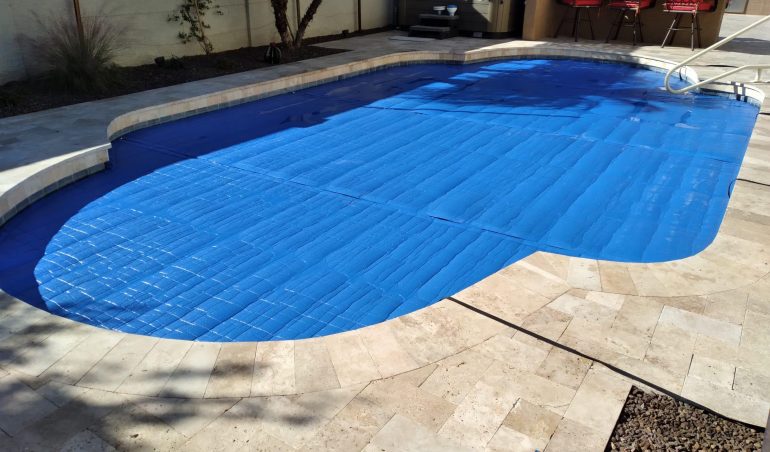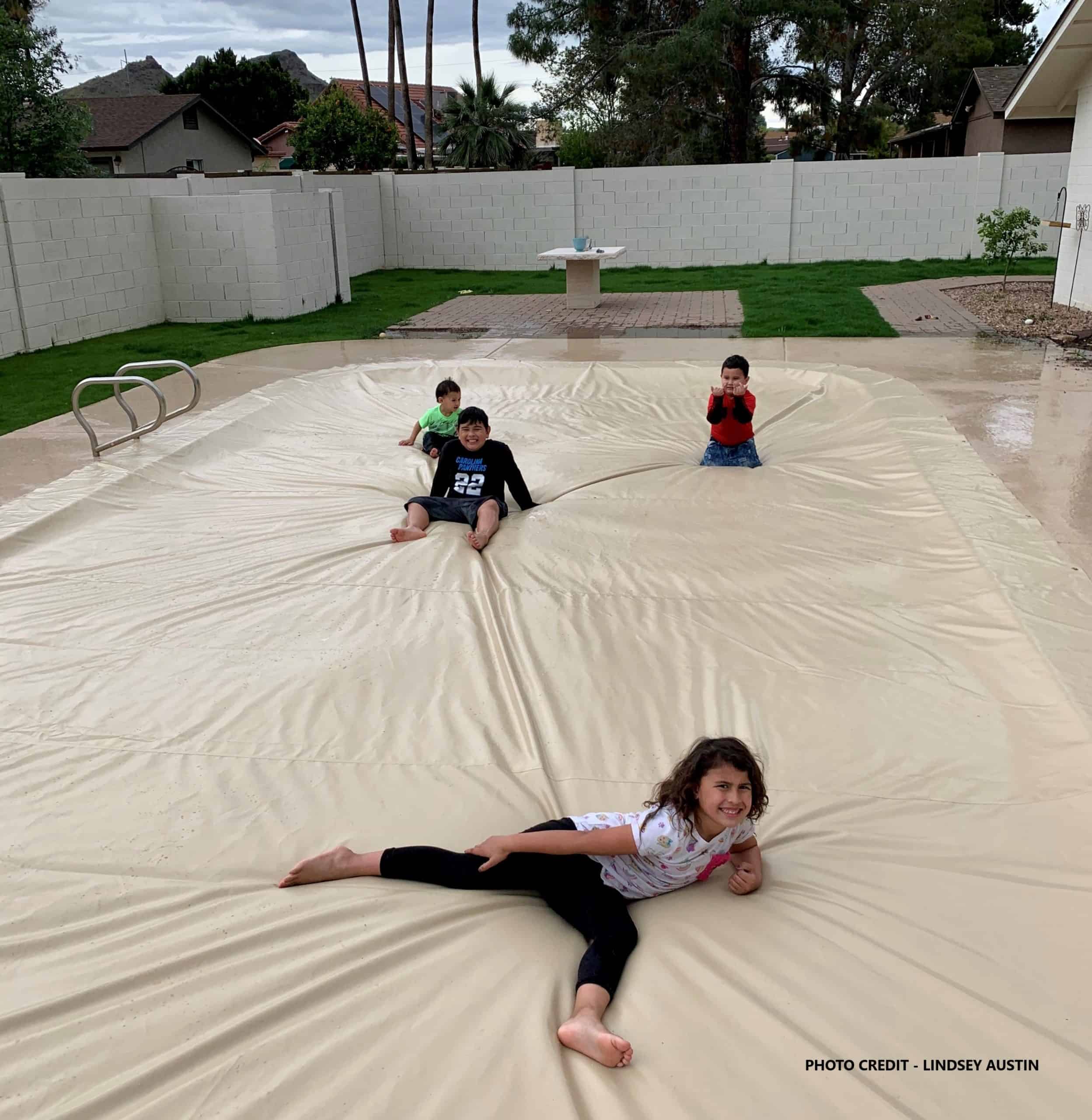When considering filling in a pool in Arizona, it’s important to understand the regulations and requirements surrounding the process. Obtaining a permit for pool filling is a crucial step to ensure compliance with local laws and to prioritize the safety and well-being of your community.
Whether you are planning to hire a pool filling service, pool filling company, or pool filling contractor, understanding the permit process is essential. The City of Phoenix, for example, provides resources and guidelines for obtaining a residential pool permit. However, it’s important to note that each city in Arizona may have its own set of rules and regulations regarding pool permits.
To successfully fill in a pool in Arizona, it’s crucial to consult the specific requirements of your city. This will ensure that you are following the correct procedures and obtaining the necessary permits to complete the pool filling process.
Key Takeaways:
- Obtaining a permit is essential when filling in a pool in Arizona.
- The City of Phoenix offers resources and guidelines for obtaining a residential pool permit.
- Each city in Arizona has its own set of rules and regulations regarding pool permits.
- Consulting the specific requirements of your city is crucial to ensure compliance.
- By understanding the permit process and following the necessary guidelines, you can successfully fill in your pool in Arizona.
Process for Obtaining a Pool Permit in Phoenix
The City of Phoenix Planning and Development Department provides a streamlined process for obtaining a pool permit for residential properties. By following the necessary steps and meeting the requirements, homeowners can ensure compliance with local regulations and enjoy a hassle-free experience.
1. Online Permit Applications: To start the process, homeowners can access the City of Phoenix’s online permit application portal. This convenient platform allows applicants to fill out the necessary forms and submit them electronically, saving time and effort.
2. Pool Property Survey: As part of the permit application, homeowners will need to provide a pool property survey. This survey outlines the pool’s location on the property and ensures compliance with setback regulations and other zoning requirements.
3. Pool Barrier Requirements: The City of Phoenix has specific regulations regarding pool barriers for safety purposes. Homeowners must adhere to these requirements, which may include the installation of fences, gates, or other barriers to prevent unauthorized access to the pool area. It is important to carefully review and follow these guidelines to obtain the necessary permit.
4. Pool Filling Cost and Water Supply: Once the pool permit is obtained, homeowners can proceed with the pool filling process. The cost of pool filling may vary depending on factors such as the size of the pool and the service provider chosen. Homeowners can explore different options for pool water delivery or supply to find the best solution that meets their needs.
By following these steps and fulfilling the requirements set by the City of Phoenix, homeowners can successfully obtain a pool permit for their residential properties. This ensures compliance with local regulations and promotes the safety and enjoyment of the pool for all.
Requirements for Pool Permit in Arizona Cities
When it comes to obtaining a pool permit in Arizona, it’s important to understand that each city has its own specific requirements and regulations. In addition to acquiring the necessary permits, homeowners may need to provide various documents to meet the city’s guidelines for pool construction.
Some of the common requirements for obtaining a pool permit in Arizona cities include:
- A site plan with accurate pool dimensions: This document provides the city officials with detailed information on the size and location of the pool, ensuring compliance with setback requirements.
- A homeowner’s association approval letter (if applicable): In certain neighborhoods with homeowner’s associations, it may be necessary to obtain their approval before proceeding with pool construction.
- Structural engineering plans: Depending on the size and complexity of the pool, structural engineering plans may be required to demonstrate that the pool meets the required safety standards.
It’s important to note that these are general requirements and may vary depending on the city. Homeowners should consult with the local planning and development department or a pool contractor who is familiar with the specific regulations in their area.
When considering pool filling for your project, it’s also essential to consider the cost and options available for pool water delivery. Costs can vary depending on the city and the service provider you choose. It’s advisable to research and compare pool filling costs and inquire about pool water delivery options available near you. This way, you can determine the most suitable and cost-effective method for filling your pool.
In conclusion, understanding the requirements for obtaining a pool permit in Arizona cities is essential to ensure compliance with local regulations. By providing accurate documentation and meeting the necessary guidelines, homeowners can proceed with their pool construction process smoothly. Additionally, researching pool filling costs and exploring pool water delivery options can help homeowners make informed decisions about their pool project.
Importance of Pool Barrier Requirements

When obtaining a pool permit, homeowners need to understand the importance of pool barrier requirements. These requirements play a crucial role in ensuring the safety and security of the pool area. Pool barriers are designed to prevent unauthorized access to the pool, particularly by children, reducing the risk of accidents and drowning.
Complying with specific guidelines for pool fences, gates, and other barriers is essential to meet the standards set by the city. The pool barrier material interpretation determines the materials and construction methods that are acceptable for creating pool barriers. It is important to understand and follow these interpretations to ensure compliance with the city’s regulations.
Why are Pool Barrier Requirements Important?
The primary reason for implementing pool barrier requirements is to prevent accidents and ensure the safety of the community. According to the Centers for Disease Control and Prevention (CDC), drowning is the leading cause of unintentional injury death among children aged 1 to 4 years old.
By installing proper pool barriers, homeowners can create a protective barrier that restricts access to the pool area, reducing the risk of accidents and potential liability. These barriers act as a deterrent, preventing young children or individuals without adult supervision from entering the pool area.
Additionally, pool barrier requirements promote awareness and responsibility among pool owners. They serve as a reminder of the importance of maintaining a safe environment and encourage homeowners to take necessary precautions, such as ensuring gates are closed and latches are secure.
Key Considerations for Pool Barrier Material Interpretation
The pool barrier material interpretation specifies the acceptable materials and construction methods for pool barriers. Homeowners must understand and adhere to these interpretations to meet the city’s standards. Some key considerations for pool barrier material interpretation include:
- Durability: Pool barriers should be constructed using durable materials that can withstand outdoor conditions, such as heat, moisture, and UV exposure.
- Height and Size: The height of the pool barrier, as well as the vertical spacing between components, must be in accordance with the city’s guidelines to prevent climbing or squeezing through.
- Visibility: The pool barrier should not obstruct visibility from outside, allowing homeowners and caregivers to monitor the pool area.
- Gates and Locks: Pool gates should have self-closing and self-latching mechanisms to ensure they remain closed and locked when not in use.
By understanding the pool barrier material interpretation and complying with the city’s guidelines, homeowners can create a safe and secure pool environment. Pool barriers serve as an essential layer of protection, preventing accidents and ensuring the well-being of those using the pool.
Pool Construction Permit Process in Arizona
Pool construction in Arizona requires a permit for the actual building of the pool, as well as any necessary electrical and plumbing work. To ensure compliance with local regulations and to avoid any potential liabilities, homeowners must follow the proper permit submittal process and provide all necessary documentation.
First, homeowners need to submit construction plans that detail the design and layout of the pool. These plans should include accurate dimensions, as well as any additional features such as spas or water features.
Additionally, site plans indicating the pool’s location and setbacks are required. The site plan should clearly show how the pool will fit within the property and any required distances from property lines, fences, or other structures.
It is crucial to carefully review the permit submittal requirements of your city or municipality. Some areas may have specific guidelines or forms that need to be completed. By understanding and following these requirements, homeowners can avoid unnecessary delays or complications in the construction process.
If homeowners are unsure about any aspect of the permit process, it is recommended to consult with a pool construction professional or a pool filling service company. These experts are well-versed in the local regulations and can provide valuable guidance and assistance to ensure a smooth and hassle-free permit application process.
By obtaining the necessary permits and adhering to the proper construction guidelines, homeowners can proceed with their pool construction project in compliance with Arizona’s regulations, ultimately creating a safe and enjoyable swimming environment.
Swimming Pool Enclosures and Safety Regulations
Ensuring the safety of individuals using a swimming pool is of utmost importance. In Arizona, cities like Scottsdale have specific pool barrier requirements in place to enhance pool safety for all single-family residential swimming pools.
These pool barrier requirements encompass various aspects, including the pool fence location, pool fence height, and gate requirements. To comply with these regulations, homeowners must carefully consider the placement and height of their pool fences to prevent unauthorized access and accidents.
When designing their pools, homeowners need to incorporate barrier details in their pool plans to meet the specific city requirements. This includes providing detailed information on the pool fence structure, gate design, and any additional safety features prescribed by the local authorities.
It is critical for homeowners to understand and adhere to these pool barrier requirements to ensure the safety and security of their swimming pools. By following these regulations, they can create a controlled and safe environment for pool users, minimizing the risk of accidents and injuries.
To illustrate the importance of swimming pool enclosures and safety regulations, take a look at the following image:
As shown in the image above, the proper placement of pool fences plays a vital role in preventing unauthorized access and ensuring the safety of pool users. The image showcases an example of a well-constructed pool fence that complies with the pool barrier requirements.
Conclusion
Obtaining a permit to fill in a pool in Arizona is a vital step to comply with local regulations and ensure the safety of the community. The process for acquiring a pool permit may vary among cities, so it is crucial for homeowners to follow the specific requirements and guidelines provided by their city’s planning and development department.
When planning to fill in a pool, homeowners should also consider the cost and options for pool filling services, including pool water delivery. Working with a reputable pool filling company or contractor can help ensure a smooth and efficient process.
By understanding and adhering to the permit process and necessary requirements, Arizona homeowners can successfully complete the pool filling process. Prioritizing safety and compliance allows individuals to responsibly repurpose their pool space while maintaining the well-being of their community.
Also, if you don’t want to go through the hassle of filling in a pool in the Phoenix or Tucson metro areas you can contact our team at Solar Safe Pool Cover for an alternative with our pool covers people love!
FAQ
Do I need a permit to fill in a pool in Arizona?
Yes, obtaining a permit is important to ensure compliance with local regulations and the safety of the community.
What is the process for obtaining a pool permit in Phoenix?
The City of Phoenix allows for online permit applications and submissions for residential pool permits. The process typically involves submitting an application, providing a pool property survey, and following pool barrier requirements.
What are the requirements for a pool permit in Arizona cities?
Each city in Arizona has its own set of rules and regulations regarding pool permits. Homeowners may need to provide a site plan, homeowner’s association approval letter (if applicable), and structural engineering plans.
Why are pool barrier requirements important?
Pool barrier requirements ensure the safety and security of the pool area. Homeowners may need to comply with specific guidelines for pool fences, gates, and other barriers.
What is the permit process for pool construction in Arizona?
Pool construction in Arizona requires a permit for the actual building of the pool, as well as any necessary electrical and plumbing work. Homeowners must submit construction plans and site plans indicating the pool’s location and setbacks.
What are swimming pool enclosures and safety regulations?
Swimming pool enclosures and safety regulations ensure the safety of individuals using the pool. Cities like Scottsdale have specific pool barrier requirements that apply to all single-family residential swimming pools.
What is the importance of obtaining a permit for filling in a pool?
Obtaining a permit to fill in a pool is crucial to ensure compliance with local regulations and the safety of the community. It is important to follow the specific requirements and guidelines provided by the city’s planning and development department.






